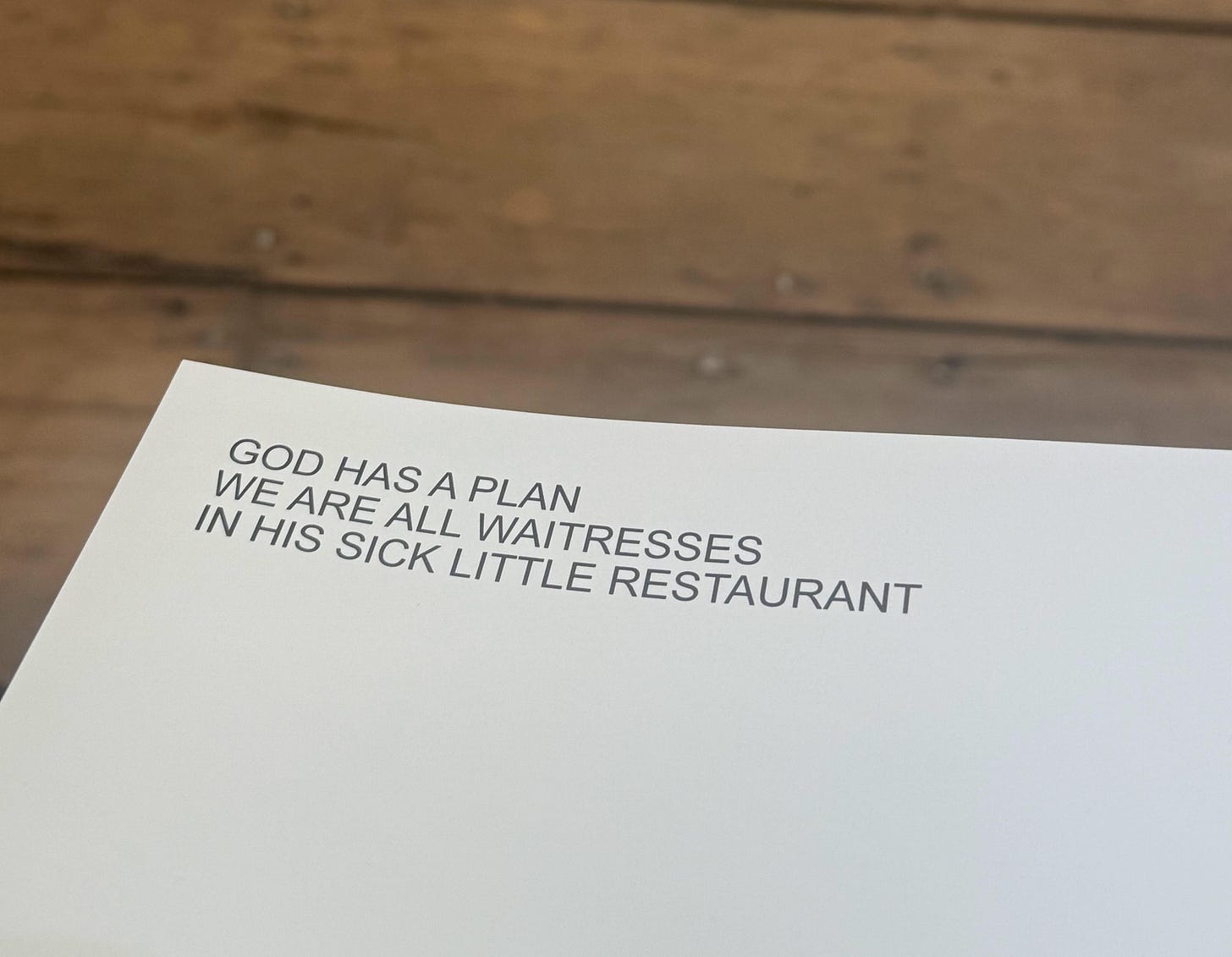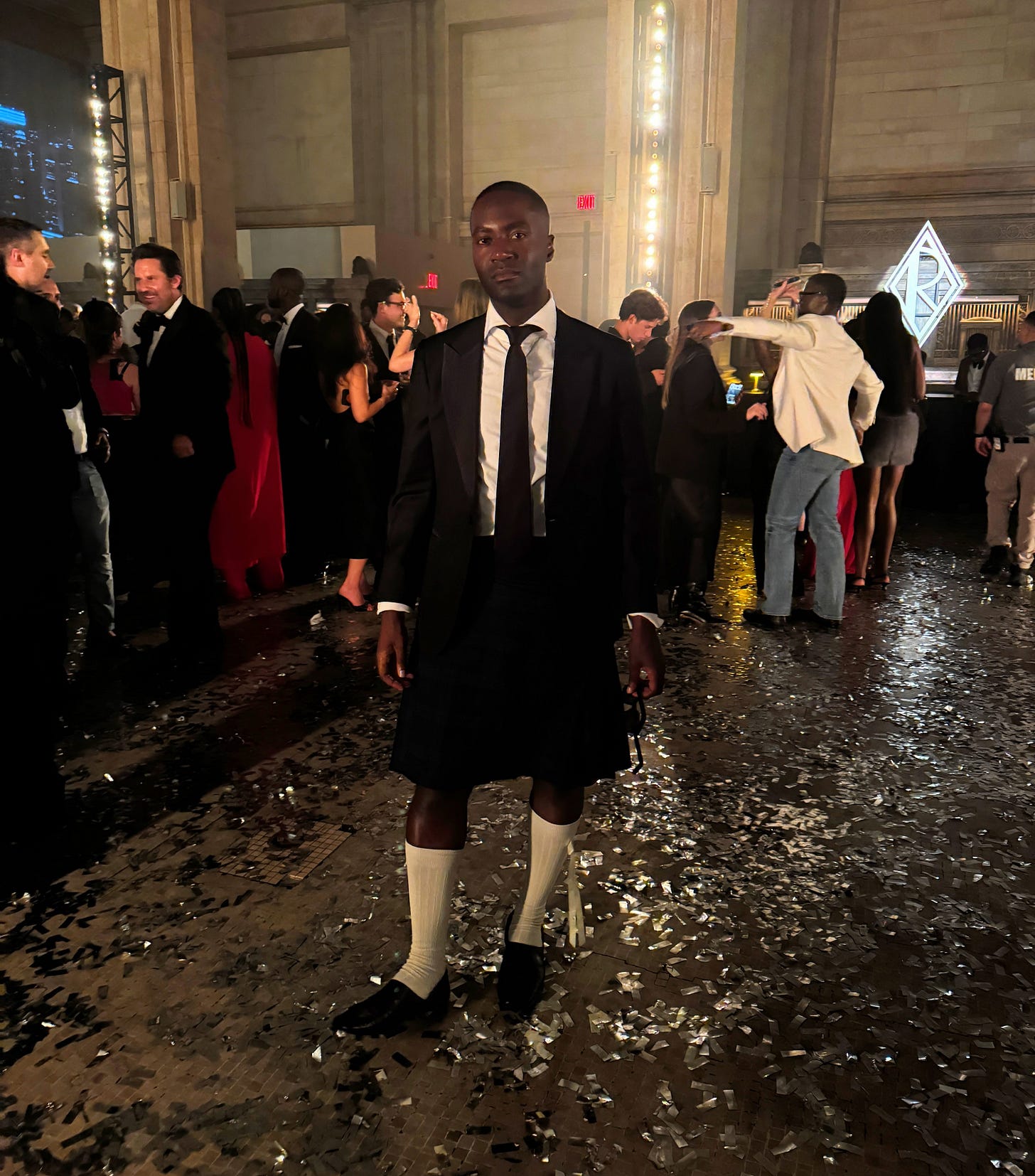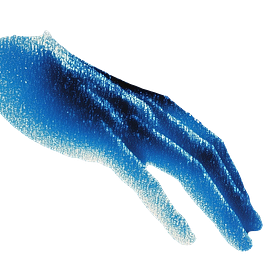"This Isn't Sex and the City"
new york fashion week, audrey hobert, the coin, and the state of things.
When Rome burned in the Great Fire of 64 AD, it is said that Emperor Nero calmly gazed out of his palatial window and played the violin, but here in New York, the boys play Clairo and are called performative for it.
I don’t see any flames, but on the C train, it’s already hot, and when I find my seat at the Eckhaus Latta fashion show, I am grateful for the tiny black fan waiting for me on my chair. Mike Eckhaus and Zoe Latta (who pens the excellent Rotting On The Vine) always write poetry on their show notes, and the stanza for Spring Summer 2026 sings out like a siren:
GOD HAS A PLAN
WE ARE ALL WAITRESSES
IN HIS SICK LITTLE RESTAURANT
The words feel apt as I oscillate the fan from my face to my body and then back to my face again. Odd times like these will have you thinking that everything is a sign; will have you accept a tarot card reading from your flower lady at the farmer’s market on a whim; will have you train across Brooklyn for a two-hour reiki cleanse because a Zoom psychic recommended to you by someone at a barbeque told you that your heart chakra is blocked until fall; will have you trade conspiracy theories back and forth in hushed voice notes to friends and the FBI agent living in your phone; will have you read the poem at the top of a fashion week show note over and over and over again, wondering what possibly could come next and how there is no use preparing for it.
But the Eckhaus Latta show is wonderful as always, and we are all excited about the duo’s recent CFDA Menswear Designer of the Year nomination. Across from me, there are newborn babies and new SNL cast members in attendance, as a saucy shirt saunters down the runway that I may have the chest for next summer if I work at it. I’ve always admired how distinct Eckhaus Latta’s designs are, how you can tell by the cut of a shirt or the print of a pant that it’s theirs. Their garments have a shared sculptural approach, and I love that every new piece I acquire from them builds on the last. Halfway through the presentation, the air starts to burn as a model sparks a joint on the runway, and I grin, forgetting the heat. Martine Syms walks out a few looks later, and I’m delighted. I think about her film, The African Desperate, when her artist protagonist quotes Sadiya Hartman to say that she is “staking her claim to opacity.” Her right not to commodify her identity in her art. I let the thought pass like a plate, knowing it will return.
A few hours after the show, a friend asks if I can make it to the West Village in an hour to see Audrey Hobert do a special concert. I say ‘yes’ even though I’m two stops away from my apartment in Brooklyn, have just ordered Thai that isn’t arriving for another fourty minutes, and need to change into ‘cocktail attire’ for a party later that evening. Somehow, I make the concert, only ten minutes late, and at the end of ‘Bowling alley.’ I guess God had a plan.
At the Cherry Lane Theatre, Audrey is a star. She’s the kind of quirked-up white girl from homeroom that I would have befriended. Lately, I have resisted listening to music with depressing elements, but what I admire most about Audrey’s songwriting is her ability to allow her protagonist to change. Very rarely does her speaker stay in the same place. Instead, they ‘realize things,’ slowly building confidence, whether it’s finding beauty in their ‘fucked up face,’ or happily leaving lame parties at the Chateau. Her songs read like a script, her screenwriting abilities on full display, and within a three-minute track, you get something similar to an episode arc. Her debut album is like a season of Sex and the City, which is the name of a song she performed last night with her acoustic guitar to the sixty of us in the room. Whenever she sings “This isn’t Sex and the City, nobody sees me and knows of my column,” I always think about LOOSEY and admittedly change the lyrics to something else in my head. Before she sings it for us, she speaks in detail about the song’s genesis and how she wrote it over the course of a week alone in her brother’s apartment in New York, labouring over the words from sunrise to sunset.
As an entertainer, she is generous, pausing between each song to share with us the micromoment that inspired it – her deliberate selection of words or production choices. As a fan, I lap it up greedily, but as a writer, I become jealous. I can never puncture or articulate the motivations of my fiction. My catalysts remain amorphous or uninteresting, usually starting as an image (i.e., a rhyming sock ventriloquist on a date) before shifting into something else. It starts slippery before becoming sturdy, and separate from my own experience. If this was intentional, I’d say I’m staking my claim to opacity, but I’m not. My motivations remain veiled from myself until the work is done.
Audrey finishes the set with two consecutive performances of ‘Sue me,’ and makes us all put our phones away for the final one so she, and we, can truly let loose. We exit the theatre with the stealth of inside traders, wrapped with the feeling that we’ve bought stock that’s about to skyrocket.
I leave the West Village and walk towards Union Square to meet up for the final event of the day. No one knows how to Saturday like me; I mean, the day started with a tarot reading and blush gladiolus, and is ending at a Ralph Lauren soirée with Usher. As I walk under the Washington Square Arch, I raise a phone to my ear and listen to my voice memo-ed version of ‘Sex and the city,’ my lyrics to Audrey’s melody. As the memo comes to a close, I hear a woman shout “Wait! Wait! Wait!” but I keep walking north, trying to suspend myself in my own voice, trying to make it through the marble arch without distractions. But alas, she catches up, and it’s clear she’s talking to me. She flags me down, I turn off the song, and receive her harried compliments and praise. It feels like a sign, out there under the arch of all places. I wait for the feeling to pass, but this morning, I still can trace the contours of it. Spinning in me like a coin.
During a flight to California last week, I finished reading The Coin by Yasmin Zaher, a debut novel that follows a Palestinian woman who moves to New York and becomes an elementary school teacher for underprivileged boys. Throughout the novel, she unravels. She cleans herself obsessively for hours a day, becomes involved in an international Birken-selling scam with her (maybe) homeless (maybe) boyfriend, and maintains a bizarre teaching method with her students. The novel is told through short, first-person splices that cut between her past and present. Early on, we learn that she is haunted by a childhood memory of accidentally swallowing a coin on the day of her parents' death. She then inherits a great deal of wealth from their will. However, upon moving to New York, she feels as though that coin, still lodged inside her, has begun to spin.
The novel is part of a lineage of contemporary literary fiction where a distressed woman distracts herself with a project, the metaphor being that she is also the project that needs to be worked on – think Miranda July’s All Fours or Ottessa Moshfegh’s My Year of Rest and Relaxation. The plot appears aimless when you assess its individual fragments, but in aggregate, as a full work, you are left with a feeling, a theme, that haunts you after you complete it. I suppose life is like this, aimless as individual days but meaningful across the years. GOD HAS A PLAN WE ARE ALL WAITRESSES IN HIS SICK LITTLE RESTAURANT type shit. The themes of The Coin followed me to Palo Alto that week, and back to New York – motifs of excess, colonization, impurity, and materialism. The inability to expunge and disinfect an inherited need for more, compounded over generations. In Yaher’s novel, I underlined the following on the plane:
“I thought about metal then, and the landscape of my childhood, how it was saturated with coins. Roman coins, gold Abbasid coins, ancient Judean coins. There were shekels, mils, and drachmas. Emperors, gods, and queens. They didn’t decompose. They just stayed there, in the ground. And the coin in my body, it was going to stay there until I died, and long after.”
Later, in my hotel room in California, I woke from a dream of a tidal wave colliding into New York, doing away with all the junk, and by proxy, me. Maybe it was putting out a fire.
At the Ralph Lauren party, no one talks about the state of the world. No one talks about anything really, and I enjoy this – the confident glide of mingling when you know everyone is game to skim across the perimeter of conversation. There’s something intimate about this, knowing that for some, on occasions like this, it’s never going to get that deep. No one is going to mention the burning or the smell of smoke, and instead would rather talk about how sweet the violin sounds, how good your life looks on Instagram, the ‘forward you wrote for Dua Lipa,’ and what you’re wearing. It’s table tennis, really. Volleying soft balls back and forth, treading lightly, none of us willing to get our hair wet. But when Usher takes the stage, he isn’t playing the violin. He isn’t playing any of his music, for that matter. Paid to appear but not to perform. Instead, he, too, skims along the perimeter, sharing a few words but keeping it light, dashingly dressed like Jiminy Cricket without the hat. It’s tough to take the stage in times like these.
At the height of his speech, the ceiling erupts with its own silver flames. The confetti is blinding, mucking up the air, blocking everyone’s cellphone cameras, caking my soda water, and it’s funny, glinting as it sputters down to lace the floor like leaked lava. We all take turns, passing our phones back and forth to snap photos in the shiny ruins, confetti tossed like sparkly coins. I briefly wonder how they are going to clean up the mess, but that thought passes on like a plate and never returns. I flip a coin and carry on against the night.
My serialized novella ‘Come If You Want’ has arrived. Read the first chapter here:
Come If You Want - Chapter One
You are reading ‘Come If You Want,’ a serialized novella by Brendon Holder. This is the first of four chapters.
Read More LOOSEY…
What's the difference between facts and the truth?
Dua Lipa’s Service95 team commissioned me to write an essay on Emmett Till to run alongside her book club selection, The Trees by Percival Everett. You can read my piece here. Up until this point, I had never written a profile for a dead person, let alone an American teenager who was lynched on the false claims of…
LOOSEY is a newsletter about culture, art, technology, and the way we live. If this is something you like, consider subscribing and sharing. Let’s be friends on Instagram.









Audrey heads we rise... love the description of The Coin, I need to finally tap in. Beautiful as always!
Brilliant!! Brendon Holder could write Sex and the City, but Carrie Bradshaw could never write Loosey.